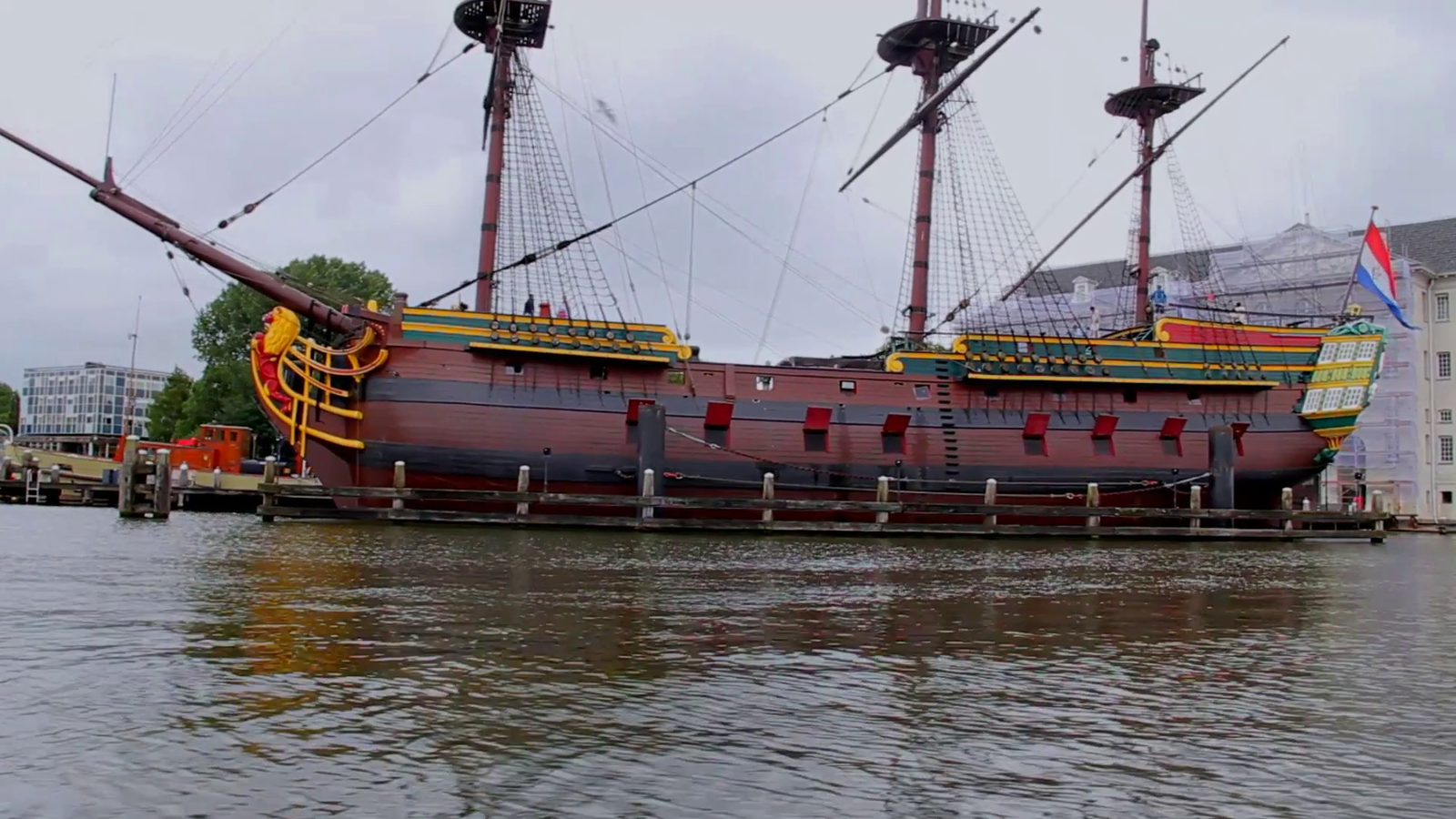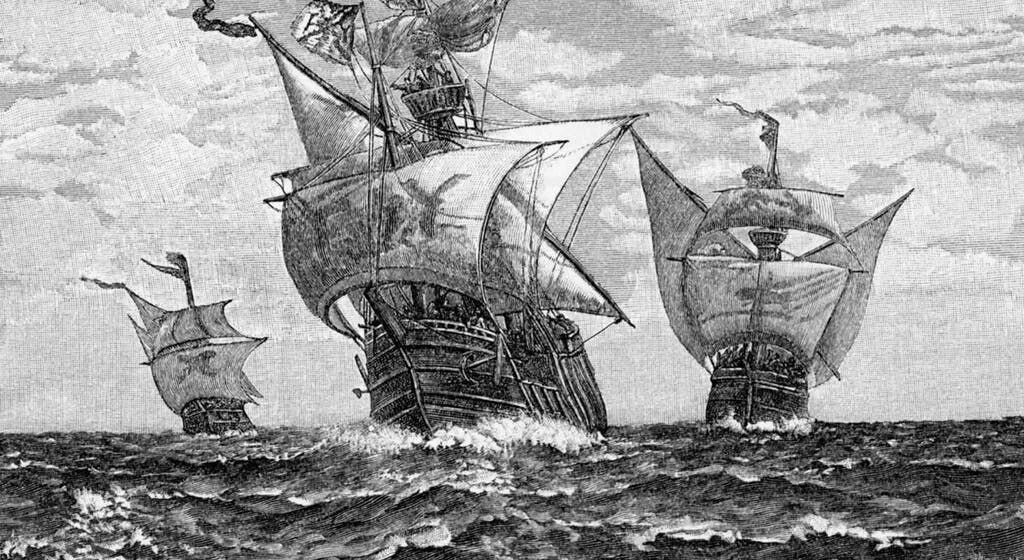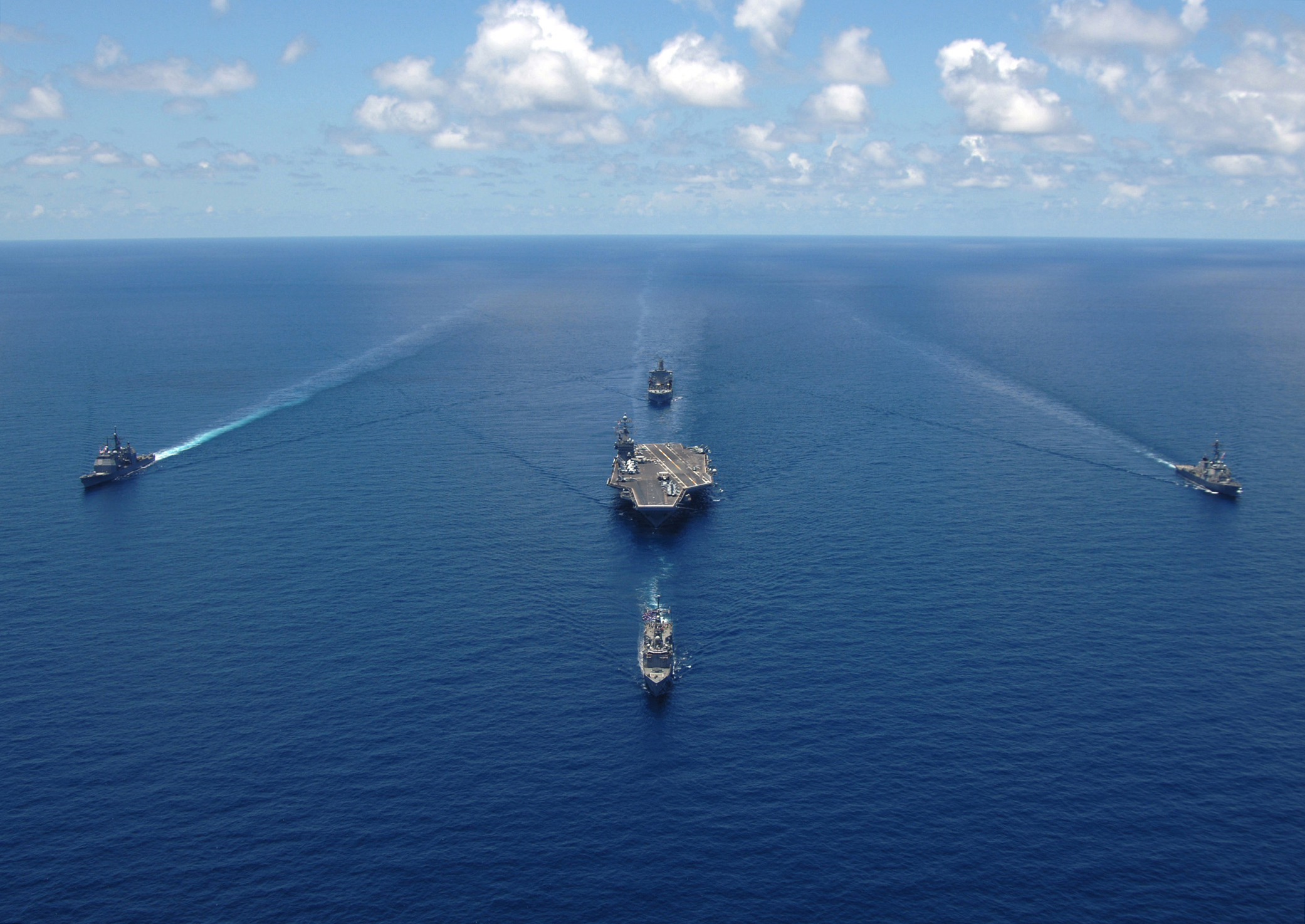These Narratives don’t end with Feudalism! Where “Take and Tax” sufficed for thousands of years, technologies grew, the world shrank, and the realization that Wealth could be created from Trade led to new and more successful ways of building Wealth. (That bold part still manages to confuse many non-economists today)
In the Mercantilist World, the prize was trade routes. Ship-building leapt forward, unlocking new deep-water global trade routes. Sugar and spice and everything nice were going to be changing hands all around the world in a grand game of musical-trading-chairs, and the Mercantilist goal was to be left holding the gold and silver when the music stopped. What were you selling? Whatever you had. No! Whatever could be had. Export everything from everywhere, sell someone’s productive labor outputs into someone else’s consumption, just so long as the money — gold — ends up in your bank account.
A replica 1700s trading ship, used for trading by a private corporation. The red flaps are not decorative: as in nature & Eve Online, “Red Means Dead”
24 cannons had to be mounted to private merchant ships because shipping lanes were the prize. China was violently pried open and sold 40,488,000 pounds of opium because who cares about conquering and taxing a people when you can get them all addicted to your product instead? “On July 8, 1853, the U.S. Navy steamed four warships into the bay at Edo and threatened to attack if Japan did not begin trade with the West.” Subtle — “Fuck you, let us trade!” — but don’t get confused. This wasn’t the same playbook Caesar ran: the demand was trade, not tribute
Mercantilism is not friendlier than Feudalism — history makes that very clear — but voluntary trade creates Wealth, which means the Mercantile system has access to a potentially-larger economy and thus more Wealth than the Feudal system, which makes Mercantilism more effective in both international and intranational competition.
And competing matters. It matters because the Mercantilist world did not replace the Feudal world, it exists on top of it. This is the second layer in the Full Stack of Society, and a core point that I’ll reiterate a few times is that all layers of the Stack can exist at the same time in the same place.
If you fail to compete, Julius Caesar and the Normans and their ilk are always there on or within your borders, Blood and Iron in hand. Invest wisely. Hot-take: the violence and threat-of-violence underlying Colonial Mercantilism was and still is morally heinous.
I know, “Colonialism == bad” is hardly a spicy opinion among Millennials today.
Here’s a spicier one: genocidal terrorist slaver Christopher Columbus, in pursuit of spices, sailed 100 men on 3 medium-size boats made of wood and nails across 3,000 miles of uncharted ocean, over the (scientifically correct) protestations of leading scholars, faced down sabotage and a mutiny, and drove those men onwards into the void, past the point-of-no-return, when more than half their supplies were consumed and land was still unsighted…
I’m not really expected to believe he went through all that just for some great spices, right??
Am I?
Mercantilist Competition Necessitates Predatory Geopolitics
Every schoolkid in America knows “Columbus sailed the ocean blue in 1492.” You know what else happened in 1492? Catholic Monarchs Isabella I and Ferdinand II finally won a 10-year war against the Nasrid dynasty, “ending all Islamic rule on the Iberian peninsula.” (Iberia is Spain + Portugal, for my American readers) Most of modern-day Spain had been under Muslim rule for 700 straight years, since the Umayyad Caliphate began their conquest.
700 years is a long, long time to spend as a conquered people, part of a distant Empire.
Here’s another famous quote from Science Fiction:
He who controls the spice controls the universe
You know who controlled the Spice Trade from the fall of the Roman Empire through to 1492?
Spoiler: the people in the middle. The middlemen. Mercantile literally means “of or relating to trade” — which means you need merchants.
When Isabella & Ferdinand won their little backwater war for Spain, the Ottoman Empire had just conquered Constantinople, i.e. the Byzantine Empire, i.e. the last vestiges of the Holy Roman Empire. The guy who did the conquering was just 21 years old and is still celebrated in Turkey as Mehmed the Conqueror, responsible for converting the world’s largest church into a mosque. We don’t need to ask how the Spanish felt about that one.
Isabella & Ferdinand spent 10 years fighting a grueling war against a fringe-Muslim dynasty just to claw back their own home soil, you think they wanted to bang with the big boys?
And yet. The Spice. He who controls the spices controls the universe. Armies are expensive. Control of the trade routes means control of the global economy, the ability to finance larger military spending, bigger and better equipped armies, the ability to capture more trade routes. It would mean your neighbors couldn’t fuck with you.
A hypothetical Western spice route, if Columbus found it, would take that all away from the Ottomans and shift the global power balance into Spanish hands, all without needing to fight a militarily superior foe. Imagine how that map above would look if America didn’t exist — China and Spain would be right next to each other, and the Ottomans would be irrelevant!
A rough day at the office in the year 1492
So it’s no surprise Columbus sailed into the Abyss. Who knows what his personal reasons were. He wrote a diary, you can read it, he comes across as a diligent Catholic zealot, which is perhaps critical to undertaking such a voyage. But the point is: someone was going to have to go. The future of Spain depended on it.
Thus begins the Mercantilist Era. The eventual victorious hegemon of which — the British — ultimately owned & dominated the very same Spice Trade that sent Colombus to the Americas.
Where do you think all that Spice Opium sold into China was grown? Certainly not on England's green and pleasant land.
Generating Wealth in a Mercantilist World is more complex than in a Feudalist world: your goal is to insert yourself into the global flow of goods and sell someone’s productive labor outputs into someone else’s consumption, so that goods & services leave your hands and gold & currency accumulate in your bank account. By any means necessary.
Investing in a Mercantilist World is also much more complex: you need to procure product to sell, uncover markets to sell into, secure trade routes to transport that product, and pay for blood and iron to defend both of those. None of that comes cheap, and as with Feudalism, positive initial returns on investment compound to build Wealth faster than those around you, allowing you to insert yourself into an ever-greater share of global trade.
Mercantilism Today: Pax Americana Secures Arab Oil
Mercantilism is the second layer in the societal cake, and parts of the world that still deal in High-Value Raw-Materials that can be sold into someone else’s consumption operate in a classically Mercantilist way.
To the extent that other nations and peoples are willing to overcome their Zero-Sum Feudal instincts and engage in Mutually Beneficial 21st Century Free Trade with America, we are ready, willing, and eager to trade back with them — like the British before us, the global naval hegemon encourages laissez-faire value-creation from everyone else and not Mercantilist value-capture. We await our trade partners with open wallets, so long as they submit to our worldview of the right and proper way to conduct global affairs, and we hold the trade routes hostage until they comply.
For everyone who does refuse, there’s Mastercard Commodore Perry a Carrier Strike Group capable of conquering the world twice-over:
This map shows the accurate locations of U.S. Carrier Strike Groups and Amphibious Ready Groups. It’s publicly available and updated weekly, because what’s the point of having a Big Swinging Navy if you don’t tell people about it?
This map puts America in the center, because that’s what any good map-maker does for his home country, but once more, just like the Spice Trade of 500 years ago, the Arab-Muslim world should be in the center of this map. I don’t have to spell it out, you know what their main export today is, black gold, black Spice, the lifeblood of an industrialized economy. Oil.
Try and draw an overseas route on this map, which is current as of October 11th, 2018, to get Spice Oil out of the Arab world and into Russia or China, without passing within obliteration-distance of a publicly-known U.S. Carrier Strike Group or Pearl Harbor. Seriously. Try sketching a route! It takes 10 seconds to realize the impossibility and it taught me something. (If you don't know where the Arab world's Oil actually is, you can start at the small patch of water to the left of "LHD 2")
If you succeed where I failed, Russia or China will pay you a billion dollars and you don’t have to give me any credit. I’ll be moving somewhere rural with good hunting and bad weather quicker than you can say “unstable geopolitical climate.”
Encyclopedia Britannica and Wikipedia will both tell you that Mercantilism was a dominant national economic policy from the 16th to the 18th centuries, "after which it was largely replaced by more laissez-faire policies. Historically, such [Mercantilist] policies frequently led to war,” Wikipedia helpfully adds, without really explaining why. The reader is expected to note the remarkable lack of war in the prior Feudal world (lol jk) and realize the complex international Mercantilist System looks like this:
[Global Trade] → [Requires Access to Products] → [Requires Ownership of Products] → [Requires Access to End Market] → [Creates & Captures Wealth] → [Funds Military] → [Guarantees & Expands Sovereignty] → [Allows for More Trade] [LOOP]
…and note that this is one hell of a fragile system, with many vulnerable international links that could be broken by a hostile power. A fragile system that sits on top of a landscape of nations that don’t trust each other because the base layer of the stack is always Feudal conflict: if you can’t create Wealth, you can always Take it. Vae victis, baby.
Which is to say: the subsequent “rise” of “more laissez-faire policies” looks indistinguishable from a victorious Mercantilist global hegemon. So long as there are other capable nations willing to compete, the possibility of building Wealth through Mercantilist value capture will be too great to resist and laissez-faire will be an impossibility.
I mentioned Pearl Harbor, and it’s fittingly still marked on the official map of US Carrier Strike Forces up above. The brutal Japanese War Machine of the 20th century thought to conquer the rest of Asia, to become the Mercantilist colonizer and not the colonized (Commodore Perry’s 1853 legacy and British actions in China branded imprints that read “How To” on the Japanese Elite). When Western public opinion swung sharply against Japan’s treatment of China, the U.S. used the very same Naval positions in that map above to break the links in Japan’s Mercantilist Wealth-building machine, necessary for the running of their Empire.
No manufactured parts were allowed to be imported to Japan by anyone. Then no machine tools. Then no airplanes. And, eventually, in July 1941: no Oil. 6 months later you get:
A rough day at the Pearl Harbor branch office in the year 1941
How can you run a Global 20th century economy without manufactured parts, machine tools, and Oil? You can’t. Thus: war. “Fuck you, let us trade!” Irony.
The First-level analysis of restricting Trade to punish a bad actor is that Trade is good for economic growth, economic growth funds military expansion, restricting Trade hurts the bad actor (wait but wouldn’t that hurt us too?!?!) and impedes their political goals, and self-interested bad-actors are therefore likely to curb their misbehaviour. Today we mostly call these Trade Sanctions, we use them to influence the behaviour of other nations, and Econ 101 says they impose an equal cost on us. A cost we pay willingly because…
…the Mercantilist Second-level analysis is that the Economic is indistinguishable from the Political and what matters in political conflict is not absolute power level, but relative power level. Since we’re already the biggest kid on the block, the global hegemon, geopolitical stability depends on us maintaining that relative power-gap, and as the imposer of Trade Sanctions we pay a cost — a real economic cost in lost trade, yes, but also a direct military one in its enforcement — to prevent the ascent of another superpower.
In 1941 that ascendant power was Japan, and we happily opted into paying an economic cost to keep them in their place. No prizes for guessing how that ego-blow was/is felt on their national psyche.
There’s a Third-level Mercantilist-Econo-Political analysis possible here too, which is to consider the implications of restricting Trade on the bad actor’s remaining viable strategies for building Wealth in the event that they do not kowtow. Hint: every layer above Feudalism requires Trade.
Snap back to the present — or rather, to 2014…
Shipping Oil by sea is 50 times more economically efficient than shipping it via land. But if you really had to find an over-land route, because you had no other choice, because there’s the most fearsome strikeforce to ever sail the seas parked between you and the Oil, and if your name rhymed with Russia…because it was Russia…which route would you choose?
Excuse my awesome MS paint skills. All the Oil in the world is buried on the shores labeled “Persian Gulf”. Red border = Russian border, black arrow is over Russian land and points towards the shortest route to get the Spice to Moscow
Look, real life is complicated, I get it & I’m not saying these two maps — US Carrier Strike Force and Google Maps — together explain the entire sorry state of affairs in the Middle East, or Putin’s friendships with Iran and his interest in Syria, or his “shocking” invasion annexation excursion to Georgia, birthplace of Joseph Stalin, a few years back, or our interest in Iraq (conveniently situated as the final blocker).
Although I’m not not saying that. Listen to Peter Zeihan if you want to begin to understand geopolitics, and look for mentions of “Oil” and “Sanctions” in the very loud, very public broadcasts we make about the location of our Carrier Strike Forces. Pro-tip: As disappointing as it might be to Israel, Iran is not the superpower America is really worried about.
What I am saying: the reports of Mercantilism’s death are greatly exaggerated. You can’t run a Global Empire without trade, you can’t run a modern Economy without Oil, and we use 11 of these bad boys to hold the metaphorical gas-pump:
Pictured: "…after which it was largely replaced by more laissez-faire policies.”
Sidenote: On “Capturing” Wealth and Imperfect Competition
When I talk with friends and describe “Capturing” Wealth in a Feudal world, most immediately understand what I mean: The Feudal Peasant works all year in the field and generates $[X] of surplus Wealth in agricultural produce.
At the end of the year his local Lord charges him ~$[X] for the privilege of using the land. While there’s some implicit use of force present in this exchange, the vast majority of peasants pay their Fees without complaint (otherwise the Lords would’ve been off threatening and killing their own peasants all day — bad for business!).
The fact that the Lord is able to afford the massive expenses of armed guards, a castle, a house and servants, fine clothes, spices for their food, paintings and churches, tea to drink, and so on, suggests that the Lord is not operating at a subsistence level — he is Capturing the Surpluses of all the peasants working his land.
Even if this hypothetical Feudal world was a Non-Violent Utopian Libertarian Free Market Economy, the supply of peasants in the Feudal Malthusian Trap was far greater than the supply of land, which pushes the price of peasant labor to zero and the price of land to ~infinity.
The end result is that despite laboring all year and actually producing a small Surplus, our poor Peasant is unable to Capture any of that Surplus. He has neither the political means (i.e. swords) nor the economic means (i.e. scarcity) to do so. Thus his Lord takes it all in Rent and Fees, which will always & forever be calculated to be approximately “everything.”
But what does it mean to “Capture” Wealth from Trade in a Mercantilist world?
Mercantilist commodities are valuable because they are scarce — just like land. There’s no Perfect Competition to be found here.
One of my first links in this Mercantilism section explains that voluntary Trade creates Wealth because it only occurs when both parties expect to gain. When your customers purchase your valuable commodity, they do so under the belief that owning it is worth $[Y] to them. The trade usually occurs so long as you price below $[Y].
Therefore you should charge your customers as close to $[Y] — as close to “everything” — as you can get. The degree to which you lower prices and allow your customer to gain further from Trade corresponds to your control over the market and your own borders: i) If you can’t keep competitors out then you’ll have to lower prices to compete, ii) and if you can’t secure your borders adequately then you’ll have to keep prices low enough to satisfy your neighbors. No need to have them getting all Feudal on you.
Trying to maximize the total net payout you get from customers is business as usual to everyone who’s ever run a company or owned a P&L. What’s distinct about the Mercantilist approach is the intentional attempt to INCREASE the “imperfectness” of the market via political measures, such that all Trade flows through you and not a competitor, which allows you to participate in 100% of value-creating global Trade and “Capture” as much of that value as humanly possible.
Under a state of Perfect Competition, no economic profit is possible. So if you want an economic profit, the solution is quite clear.
“Political measures” might mean tariffs, treaties, quotas, subsidies, single-market agreements, unwritten agreements, threats, unequal taxation, blockades, blocking access to financial markets, funding piracy, fomenting rebellion, outright military conquest, etc. etc. — whatever it takes. Sometimes the product is sufficiently scarce that mere ownership is sufficient. For more on why it’s important to Capture the value you create if you care about building Wealth, listen to Stanford’s Startup Class #5: “Competition is for Losers”
Mercantilism Recap
I think this is a decent drawing, but seriously, if you know a better artist, please get them to email me!
Wealth can be created from Trade (confusing to many non-economists).
Wealth from Trade can be Captured to the benefit of a nation or an individual (confusing to many economists).
Capturing Wealth via political means incurs a cost that immediately reduces the Total Global amount of Wealth outstanding (obvious to all economists since Smith, Ricardo, & Bastiat).
Occasionally the Wealth Captured by one party is greater than the amount of Wealth they would lose via the reduction of Total Global Wealth incurred by their act of Capture. The study & practice of this is, broadly, Mercantilism. It is possible to benefit from a bigger slice of a smaller pie. This heretical thought is of course deeply seductive to every 2-bit politician looking for a free lunch, a particular plague of democracies, and so much of modern economics has taken the defacto stance that this is in fact impossible. It’s a bridge too far, yes, but it’s a claim that’s made with a reasonable appeal to The Greater Good — afterall, the average political hack would default to Cronyism or Populism in ZERO seconds if they ever learnt this stuff, and most economists would rather bear the sin of a white-lie than be blamed for the collapse of The Long Peace. This is the “Trade Lie” Eric Weinstein referenced in his popular tweetstorm of 2017. Watch the YouTube link (timestamp: 46:50) in said tweetstorm for more discussion.
Wealth creation through Trade means more people are exposed to the Wealth creation process, necessitating service providers & facilitator industries who can provide differentiated value and Capture some Wealth for themselves
Think: merchants, lawyers, bankers, accountants, managers, naval engineers, etc. etc.
The system is Fragile, with many weak links that can be exploited by a hostile adversary to cause a downward econo-political spiral resulting in total loss of sovereignty for the victim — causing constant paranoia, predatory Geopolitics, and a tendency toward a single Global Hegemon
There’s not a major Mercantilist Political Movement in the U.S. right now (besides the Corn Lobby), perhaps because the outsized Wealth creation from Mercantilism is so obviously funneled into a tiny group of people that it’s never going to fly in a Democratic system
Alaska’s Sovereign Wealth Fund — with its Oil profits distributed to Alaskan Residents — is perhaps a good example of Democracy and raw-materials-Mercantilism working together, and it seems to run smoothly and keep everyone happy…
The [Democratic] Socialists in American politics might do a better job convincing their die-hard opponents (if that’s even their goal?) that government can work smoothly by swallowing their distaste & pointing to Alaska, a deep red state with a GDP comparable in size to the Nordics, than far-away “smelly Europeans.” Just saying. Thank me later.









